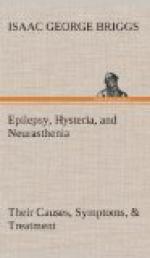Corporal punishment is unsuitable for neuropathic children, for the mere suggestion of its application usually causes such excessive dread, mental upset and terror as make it really dangerous. Such children are often said to be “naughty” when in reality they are unable to exercise self-control, owing to defective inhibitory power. Try patiently to inculcate obedience from the desire to do right, and make chastisement efficacious from its very exceptional character.
“The young child is too unconscious to have a deliberately perverse intention; to ascribe to him the fixed determination to do evil, is to judge him unjustly and often to develop in him an evil instinct. It is better in such a case to tell him he has made a mistake, that he did not foresee the consequences to which his action might lead, etc.” Many parents fall into a habit of shaking, ear-boxing, and such-like harmful minor punishments for equally minor offences, which should be overlooked.
In all little troubles, keep quite calm. The child’s nerve and association centres have not yet got “hooked up”, and you cannot expect it to act reasonably instead of impulsively. This excuse does not apply to you. One excitable person is more than enough, for if both get angry, sensible measures will certainly not result.
The necessity for calmness cannot too strongly be urged. The treatment for a fit of temper, is to give the unfortunate child a warm bath, and put it to bed, with a few toys, when it will soon fall asleep, and awake refreshed and calm.
Proceed gently but with absolute firmness, start early, and remember that example is better than precept.
Religion. Offering advice on this subject is skating on very thin ice, and we do so but to give grave warning against neuropathic youth being allowed to contract religious “mania”, “ecstasy”, or “exaltation”.
Neuropaths are given naturally to “see visions and dream dreams”, and if this tendency be exaggerated an unbalanced moral type results. Jones says:
“The epileptic is apt to be greatly influenced by the mystical or awe-inspiring, and is disposed to morbid piety. He has an outer religiousness without corresponding strictness of morals; indeed the sentiment of religious exaltation may be in great contrast to his habitual conduct, which is a mixture of irritability, vice and perverted instincts.”
Lay stress on the simple moral teaching of the New Testament, and avoid cranky creeds, cross references, or Higher Criticism. Teach them to practise the moral precepts, not to quote them by the page.
Without this practical bent, a “Revival” meeting is apt to result in a transient but harmful “conversion”; a form of religious sentiment which finds outlet, not so much in works as in morbid excitement. In these people, as in the insane, there is often a weird mixing-up of religious and sexual emotion.




